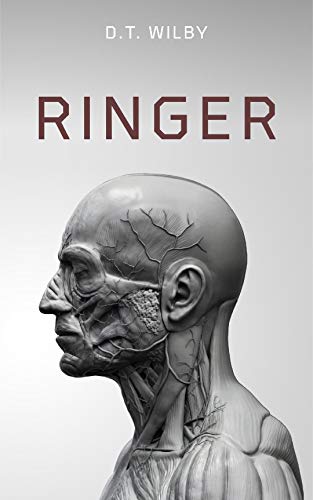
My first attempt to read Ringer ended in failure. Let me explain why. I read before I go to sleep at night. On the nights I read Ringer, I went to bed much later than usual, so my focus lacked the typical razor-sharp edge. Why does this matter? Ringer requires your full attention. To wholly immerse yourself in this brilliant psychological horror/sci-fi novel, remain alert. Don’t do what I did and make it 40% of the way through the book and have to start over. I’m glad I did start over, but I felt like I betrayed the book in my first attempt.
Wilby’s book is a slow-burn intelligent read. Right from the first few sentences of chapter 1, the book starts its scary-as-hell ride. We delve deep into our protagonist Will’s mind, and it’s a scary place. I felt goose-bumps on my skin, and the fear Will had while stuck in his nightmare. Some authors are overly verbose (Stephen King, I’m looking at you). D.T. Wilby is not. He crafts his paragraphs to ensure readers never feel burdened with the thought, “OK, we get it. Enough already. Move on.”
He had heard stories of people cutting through their limbs. Skin, flesh, sinew, bone. Just to save themselves from some unspeakable danger. Knowing what was in store for him next, Will had plenty of sympathy for those unfortunate souls. He would have gladly bitten through his own tongue just to give himself the jolt he needed to escape his invisible chains.
The entire book is from Will’s perspective. With minimal surrounding characters, Ringer reminded me of the movie Castaway. Consider what it takes to write a book focusing on a single person. Not only is it limiting, but it’s challenging to capture your readers’ attention. However, D.T. Wilby flawlessly executed every part of Ringer, and I couldn’t put the book down. I mentioned earlier that I classify Ringer as a slow-burn novel. Usually, I’m not a fan of anything slow-burn. I don’t have the patience for it, and I tend to miss out on some fantastic sci-fi work because of it. Ringer makes is an exception to my rule. Wilby set the pace so perfectly in Ringer that I’d compare it to a Fibonacci sequence. As the book progresses, Will’s psychosis worsens. Shocking incidents and revelations occur.
At the end of the book, I felt I knew Will. Everything about him, from his past to the way he thinks. Despite being a sci-fi book, Ringer remains wholly grounded in reality. Humans are imperfect and life never turns out the way we intend it to. We’re all flawed, and I actually felt better about myself at the very end. Things can always be worse, right?
P.S. this is one of the few books I intend to re-read many times. It’s that good. Plus, look at the book cover. My goodness, it’s brilliant and chilling at the same time.
Buy Book: Amazon US | Amazon UK | Amazon CA | Amazon AU
Find it on Goodreads | Connect with the author Website | Twitter


